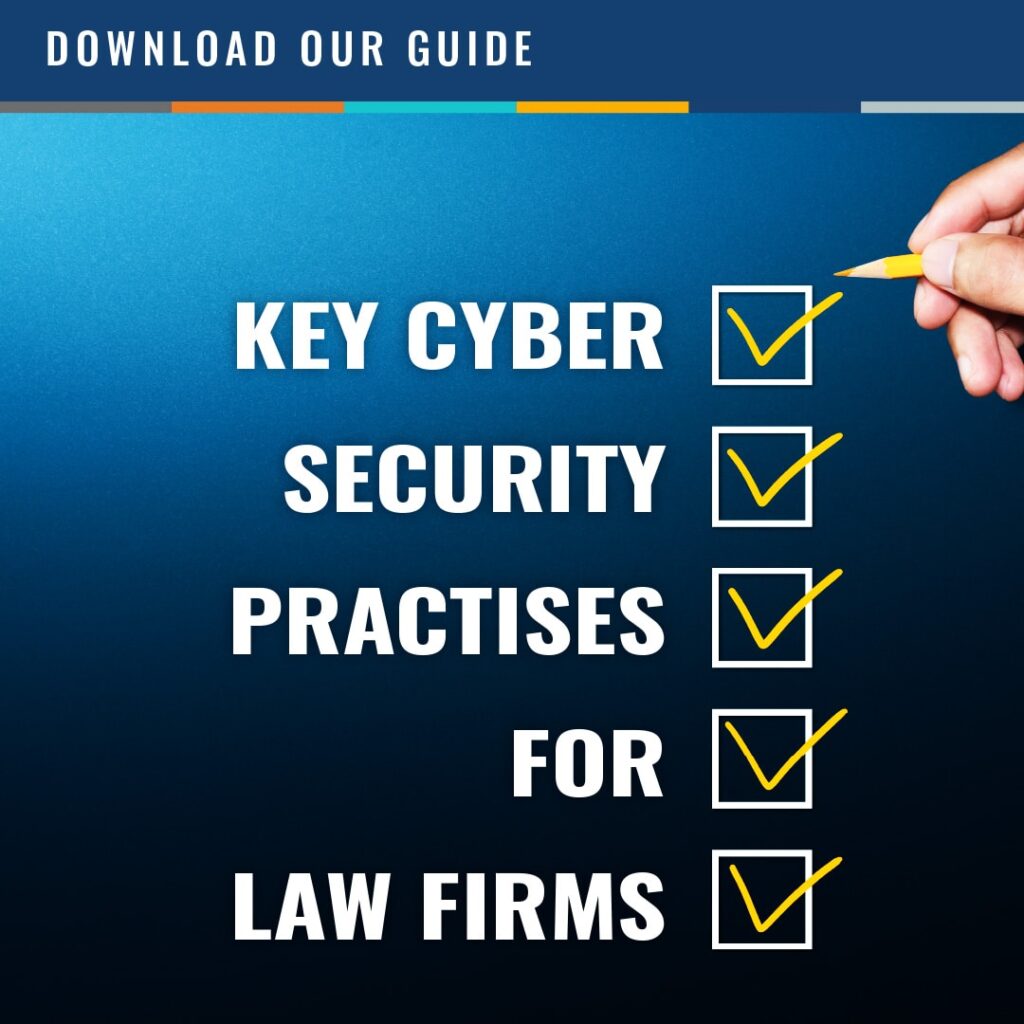Cyber security should be a top priority for any law firm. Hackers target law firms because they rely on technology and have access to valuable client information and confidential attorney-client data. Firms are not only obligated to protect their own proprietary information, but also their clients’, and the best way to protect yourself is to ensure that you have solid cyber security practices for your law firm. Here are 6 Key Steps…
1. Understand your risk
Reliance on technology and remote working has made law firms more vulnerable to outside infiltration. In fact, 26% of law firms have already experienced some sort of security breach. If not properly protected, personal or business information could be compromised, leaked on social media, or taken hostage by ransomware.
This could result in the loss of client and public trust. At worst, your firm could face malpractice allegations and lawsuits. According to the Canadian Bar Association (CBA), it is your firm’s responsibility to prevent inadvertent, or unauthorized, access to client information.
2. Create cyber security practices for your law firm
Tech failures aren’t always the root of the problem. The majority of security issues begin with simple user error. The best way to avoid this is to draft a clear, easy-to-follow, data security policy that includes best practices regarding technology, mobile use, internet use and social media. Then, share it with everyone at your firm.
If your firm allows lawyers and staff to BYOD (bring your own device), make sure that there is a clear policy when it comes to the use of personal devices for work. Be specific on how devices can be used and give the law firm ultimate control over these devices by installing a remote location-tracking “app” or even mobile device management (MDM) software that can remotely “wipe” the employee’s device if they ever leave the firm’s employment.
Make sure to review your protocols and policies regularly and conduct regular audits by building them into your firm’s data security strategy.
3. Train staff about cyber security
Every new staff member or lawyer should be trained on confidentiality and how to avoid a data breach. Don’t assume that everyone knows the latest hacking tricks. Many people often believe that their company’s anti-virus and spam filtering software offers 100% protection against most malware and/or viruses.
There are other, more subtle ways that a hacker can penetrate your firm’s network, such as phishing scams, where hackers use emails to trick people into revealing personal information like passwords.
Create awareness, explain how hackers infiltrate systems, and how to watch for threats. Reinforce this learning with continuous training and updates, so staff can learn about ever-evolving threats and new ways to counteract them.
4. Implement Organization-Wide Security Measures
Take some proactive measures to ensure your data is well-secured by making these steps part of your cyber security practices for your law firm:
- Restrict levels of access. When allowing access to specific devices, tools and/or documents, grant permission only to those who require it
- Lost or stolen laptops are a top cause of data breaches (56%), so make encryption mandatory! Encryption basically translates your data into a “secret code” that is unreadable until you provide a key or password
- Enforce a uniform password policy. Never allow the same password for multiple accounts and ensure that all passwords contain at least 12 characters, upper and lower case letters and some numbers. Consider using password managers to help you keep track of all your passwords
- Have protocols in place on how to use wireless networks securely. If staff work outside the home (coffee shops etc.), make sure staff are aware of the dangers of using public Wi-Fi. Instead, consider setting up a virtual private network (VPN) that will encrypt any data sent or received, or purchase your own mobile Wi-Fi hotspot
5. Be Prepared for the Worst
As much as we all dread it, data breaches can happen, even with the best prevention. To mitigate this risk, you need to have a plan of attack before it happens.
Your plan should include security protocols and next steps in case of unauthorized access. Staff should know how to report security breaches. Consult the CBA to better understand your obligations to regulatory authorities.
Don’t rely on theoretical models. Test the plan to ensure it works and always have a disaster recovery or business continuity plan that will ensure your law firm can continue to operate in the event of a disaster (this should include routine backups of your data to a secure, off-site location).
You may also want to consider cyber liability insurance coverage that can help your law firm cover the costs related to a data breach. It could mean the difference between surviving a data breach with minimal damage versus not surviving at all.
Six Key Cyber Security Practices For Your Law Firm:
If you work in a legal practice, cyber security should be a top priority. Hackers target law firms because they rely on technology and have access to valuable client information and confidential attorney-client data. Law firms are not only obligated to protect their own proprietary information, but also their clients’, and the best way to protect yourself is to ensure that you have solid cyber security practices for your law firm.
Here are 6 Key Steps…
6. Educate Clients
Though your law firm is the one bearing the risk if you expose details to hackers and scammers, clients can inadvertently be part of the problem. They can also be part of the solution if your firm gently educates them on the best ways to better protect their sensitive data when dealing with your law firm.
Before they take an action that is not secure, make sure they have a secured client portal they can access. Before the end of your first meeting, walk them through details such as how to log in, create secure passwords, and what steps clients are expected to take to preserve confidentiality.
Conclusion
Remember, it’s important to have the right policies and cyber security practices for your law firm. It can help mitigate the risk to both your clients and your staff. Your priority should be analyzing and improving your data security as soon as possible, to avoid potential breaches. Some of the latest Print and Managed IT technology can also enhance your security even further while also improving your firm’s overall efficiency.
Where should your law firm start? Contact Com Pro and we can help you secure your data with powerful IT and Print solutions.



